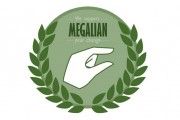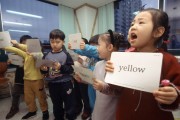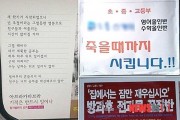Stories of young people unable to write the Chinese characters that compose their own name or read restaurant advertisements are driving a debate about how important it is for Korean students to learn the characters. Known as 한자 (hanja), it was the case until recently that South Korean newspapers were unreadable without knowledge of at least one thousand characters. In the latest development, the Seoul Department of Education is planning to increase opportunities to study the characters in school starting with the fall 2013 semester, a reversal of years of declining interest in the subject. While parents groups and NGOs demonstrated against the policy, the Korean internet seemed to push in the other direction, claiming it was important to know the roots of modern Korean, despite the time required to study the characters. Some made comparisons to the continuing practice in English-speaking countries of teaching Latin.
Article from Yonhap News:
Argument intensifies over hanja education
The world of hangul studies and childhood education have collided in an unusually sharp argument over the future of hanja in schools.
The spark for this latest conflagration was the decision by the Seoul Department of Education to expand hanja education in its elementary and middle schools starting in the 2013 fall semester
On July 3rd, civic groups devoted to hangul and parents of schoolchildren gathered in front of the Department of Education’s office building in Jongro and held a press conference detailing their opposition to teaching hanja in elementary schools.
The Coalition for Hangul Culture, the Association for Hangul Studies, and other hangul organizations, New Right parent associations which typically voice their concerns about the Department of Education’s policies, conservative education groups and progressive education groups all stood side by side in presenting their position during the meeting.
South Korean elementary schools had been using hangul-only textbooks for the past forty years, however the hanja expansion policy introduced by Moon Yong-rin, Chairman of the Seoul Department of Education, would have marked a change back toward hanja-based education. This fundamental change lead to the unusually unified opposition showing on July 3rd.
Starting in the fall, the Seoul Department of Education will implement a policy that encourages city elementary and middle schools to use textbooks that prioritize learning hanja terminology. The department is currently looking at the demands of teaching hanja and parents’ concerns in regards to hanja education.
Hangul advocates and a number of education civic groups have branded the policy “a return to the past.”
According to critics, “Chairman Moon is advocating for the cause of teaching hanja in school because he believes that it is difficult to understand the words in the textbooks, but he is doing so based solely on his personal feelings rather than any objective evidence.”
The opposition claims that the students have a hard time understanding the hanja-based terms in their textbooks, but that it also takes too long to teach them the characters. They say that if such is the case, it would be better to replace the difficult words with more native Korean words rather than trying to teach the hanja.
Opposition groups also suggested that the hanja education policy will place an additional burden on students, thereby pushing them to rely more on private education and tutors.
The Seoul Department of Education has responded by saying that the opposition is overreacting, since the hanja classes will be optional and taught after school hours. The classes are also intended only to improve knowledge of Korean words.
During an internal meeting last month, Chairman Moon stated that “the hanja expansion policy is intended to increase understanding of Korean, not to undermine the hangul-only education approach…make sure that there are no misunderstandings.”
A spokesperson for the Seoul Department of Education said that “knowing hanja is helpful for understanding lectures in class…we won’t be teaching characters or hanja phrases that are more difficult than the rest of the textbook.”
Comments from Nate:
nask****:
I studied High Standards hanja as a child, went to a calligraphy hagwon, and among people my age I am regarded as being a better than average reader of hanja. That being said, I think it is impossible to not study hanja when you are studying Korean. Knowing hanja is a huge benefit to studying Korean because even if you have never encountered a particular word before, you will be able to understand its roots and infer its meaning. I am living overseas right now and I see students who study English by first going over the Latin roots. By doing so, they are able to infer the meaning of complicated medical or engineering terms at first glance. You can think of hanja as fulfilling the same role.
foon****:
Teachers of Korean always emphasize the importance of learning hanja. I don’t know what the hangul advocates are thinking, standing silent whenever there is an increase in foreign language education but rushing to oppose learning about the root of our language
kh99****:
thanks to the Magic Hanja series, today’s children are all masters of hanja…
m830****:
As I’ve grown older, I realize that it is important to know hanja.
worm****:
Knowing hanja helps you with your word choice, reduces syntax problems, and widens your vocabulary, all of which improves your reading and learning skills,,,learning hanja as a child is definitely helpful. Since 70% of our language is hanja, just learning native Korean words will end up being inefficient. Even just studying the basic 2000 hanja characters isn’t enough
musi****:
Example: ‘In regards to Seven and other ‘entertainment soldiers’, the Ministry of Defense expands its ‘감사’ (can be translated as the word ‘thanks’).
‘감사’? The Ministry of Defense is thankful for the investigation into the program? Or does 감사 mean the same thing as 조사 (to report)?
But if you include the original hanja characters…
‘In regards to Seven and other ‘entertainment soldiers’, the Ministry of Defense expands its 監査’
Ah, ok, so then they are starting a ‘directed investigation’ (감독의 감, 검사할 사)
Obviously, knowing hanja will increase understanding of a text
jwge****:
Just because they are going to start teaching hanja doesn’t mean that Korean will be tainted. A huge proportion of the words in Korean are based on hanja. But that being said, I don’t think it is necessary to go take private lessons in order to learn hanja.
yxyz****:
There are a lot of critics saying, “What use is hanja during my daily life?”, but most of us are well aware that most Korean words are descended from Chinese characters. For each of those words, there is an appropriate context and usage. The only way to know the context and usage is to know the etymology of the words. Without that knowledge, you will never be able to succeed in studying Korean. How could someone ever grasp the outer covering of a fruit without knowing about the seed inside as well?
There are those who think Chinese characters are like history, just the simple background to modern life, and thus not very important. But when you look at modern teenagers and people in their twenties who have received a haphazard history education, their understanding of history and their elders is lacking. Because of this, they are more vulnerable to fabrication, rumor, and propaganda. They are also less clear of their own identity.
They then tend to clash more with the society around them and suffer from misunderstanding. They just tire themselves out fighting with obstacles they don’t understand, regress in their development, and give up.
The end result is that this generation is unable to grasp the most fundamental explanations for their life and just lose track of the world around them. Just like knowledge of history, knowledge of Chinese characters is a process of understanding context.
Don’t try to just teach the easy subjects. Children these days have no sense of philosophy, they just live for themselves. A country filled with such people will inevitably lose its soul. Knowing the fundamentals is absolutely, without a doubt, incredibly important!!!
sobo****:
They’ve got to pay more attention to national history and modern history..
m113****:
Education about Chinese characters is essential if we are going to stop the usage of absurd new slang like dae-in-bae (an etymologically incorrect term for a generous person)
lws8****:
It used to be that they taught Chinese characters alongside native Korean words, I don’t know where this idea of only teaching native Korean words came from.. While we may be speaking Korean, there are so many Chinese characters mixed in, each of which can make subtle changes to the meaning of a word. And despite all of that, they don’t want to teach Chinese characters? So then why are they encouraging mixed use of English and Korean? Are there any Korean words that include English letters?? How silly is it that they try to avoid using Chinese characters which are loaded with deep meaning while at the same time trying to mix a completely unrelated language in with Korean… What a load of bullshit conflict between the older generation and the younger generation tsk tsk tsk
wong****:
Try studying the law and you will immediately know why Chinese characters are necessary. There are so many legal terms that compound Chinese characters with Korean words. Even if the learning of Chinese characters is just an elective course, you will be able to see the usefulness. Educated people know that your ability to understand terminology depends greatly on whether or not you know Chinese characters
dpql****:
Considering how today’s students can’t tell whether North Korea invaded the South or the South invaded the North, why are we overlooking the importance of studying Chinese characters? Kids who can’t even read the simple characters in store names look so ignorant
thde****:
Learning them can be helpful, but are there really that many opportunities to use that knowledge?









